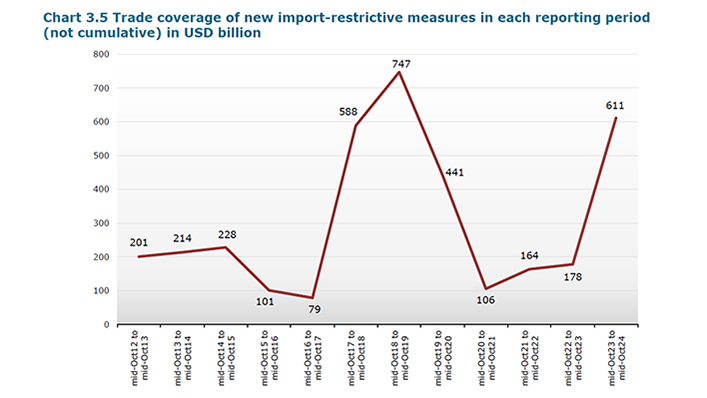
Speaking at the launch of the report, WTO Director-General Ngozi Okonjo-Iweala highlighted that the value of trade covered by the 169 new trade-restrictive measures introduced by WTO members during the 12 months leading up to mid-October 2024 was estimated at USD 887.7 billion – half a trillion dollars more than the value of trade covered by restrictions introduced in the preceding year, which stood at USD 337.1 billion.
DG Okonjo-Iweala welcomed a parallel increase in trade-facilitating measures, including tariff reductions, simplified import procedures, and the removal of quantitative restrictions, which covered an estimated USD 1,440.4 billion worth of traded goods during the review period – also up almost half a trillion dollars from the USD 977.2 billion covered by trade-facilitating measures between October 2022 and October 2023. She also underscored the positive trend in services trade, where the report indicates that the majority of the 134 services-related measures introduced over the past year were trade-facilitating.
Nevertheless, DG Okonjo-Iweala warned that trade-restricting measures were adding up.
“There is little meaningful roll-back of existing trade restrictions. That means the stockpile of trade restrictions continues to grow,” she said. As of mid-October 2024, the stockpile of import restrictions in force was affecting an estimated USD 2,942 billion representing 11.8% of world imports. The comparable figure from a year earlier was USD 2,480 billion, or 9.9% of world imports.
DG Okonjo-Iweala cautioned that “export restrictions are also gaining momentum.” Over the review period, export-restricting measures covered USD 276.7 billion in traded goods, representing 1.1% of the value of world merchandise exports – well above the USD 159.1 billion (or 0.7% or world exports) covered by such measures introduced in the previous reporting period.
Overall, the accumulated stockpile of export restrictions since 2009 is estimated to affect 3.2% of world exports (worth about USD 786 billion). “An important silver lining here is that our tracking of export restrictions on food, feed and fertilizers put in place since late February 2022 shows that these have decreased significantly, today covering an estimated trade value of USD 11.8 billion, down from USD 29.6 billion a year ago,” said DG Okonjo-Iweala.
Regarding trade remedy initiations, WTO members implemented an average of 28.2 per month during the review period, up from 16.7 in the previous period. This marks the end of the slowdown observed since 2021 in the number of initiations of trade remedy investigations. The monthly average of trade remedy terminations recorded for this period was 9.3, the lowest average recorded since 2015. Trade remedy actions, especially anti-dumping measures, continue to be a central trade policy tool for WTO members, accounting for 49.5% of trade measures on goods.
While DG Okonjo-Iweala emphasized that trade has shown resilience to the shocks of recent years, she warned that “the global trading environment appears increasingly fragile, uncertain and precarious.” The resilience trade has shown “looks fragile amid geopolitical tensions and unilateral measures,” with the trading system routinely getting blamed for trade imbalances that are largely the product of domestic macroeconomic forces within leading economies. “Yet the fact is that trade remains an important part of the solution to the challenges of our time, from accelerating growth and job creation, to ensuring food security and tackling climate change,” she said.
“That is why we need to shore up the rules-based trading system – to reform and re-invent it to withstand the current pressures and keep delivering for people everywhere, and for the planet. This has consistently been my message to you, and it was at the core of what I said to G20 leaders in Brazil last month,” she told WTO members. Her full remarks are here.
The report also indicates that during the review period several economies announced and implemented trade and trade-related measures citing national security considerations. Preliminary research by the WTO Secretariat suggests that the overall estimated trade coverage of these measures remains limited at around USD 79.6 billion or 0.2% of world trade.
Also, numerous new support measures introduced by governments included climate change-related measures, environmental impact reduction programmes and schemes to support the transition to a low-carbon, more resource-efficient and sustainable economy.
Finally, WTO monitoring points to the increasing evidence of trade fragmentation linked to geopolitical concerns. Trade is increasingly conducted among like-minded economies, a trend accelerated by the war in Ukraine. At the same time, the report states that a broader shift towards regionalization or near-shoring at the global level is not yet in evidence.
Share
Reach us to explore global export and import deals